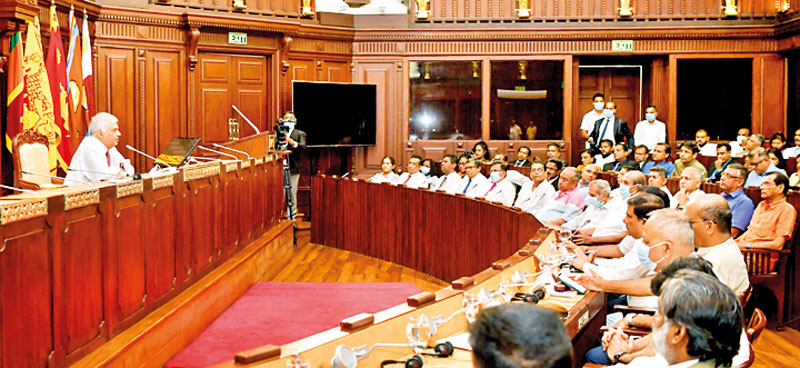Saturday Feb 21, 2026
Saturday Feb 21, 2026
Monday, 10 October 2022 00:10 - - {{hitsCtrl.values.hits}}

|
President Ranil Wickremesinghe
|
President Ranil Wickremesinghe yesterday announced a raft of amendments to the electoral system, noting that the existing political system was a major cause for the current economic crisis.
“A referendum will be called to decide on the parliamentary electoral system if the Select Committee which is proposed to be established fails to decide on the matter by July next year,” he said during a meeting with professionals held at the President’s Office yesterday.
President Wickremesinghe said plans are also underway to slash the number of local Government councillors by 50% before the next election.
“Before the next election, I intend to reduce the number of council members for local Governing bodies such as Pradeshiya Sabhas, Municipal Councils, and Urban Councils from the current 8,000 to 4,000,” he added.
President Wickremesinghe also said ‘Jana Sabha’ will be introduced to streamline the local government councils.
“The Executive powers will be shifted to a chairman-led committee instead of a single chairman being vested with all the authority. The draft laws will be prepared to incorporate these amendments before the next local Government elections,” he stressed.
Noting that the main cause for political corruption is the preferential system, President Wickremesinghe said that a non-preferential list system or a mixed electoral system should be immediately adopted and restrictions should be imposed by the election law on the amount of money spent on elections.
“There are two main issues before the country today. One is the economic crisis while the other is the rejection of the political system by the majority of the population. Many are of the view that the cause of the economic collapse is the existing political system. Different groups have been formed within the Parliament due to the party system. I work for the people irrespective of narrow party lines,” he said.
President Wickremesinghe cited fewer youth representatives as another key factor in the political parties today. “Many work with the same old people just for namesake. There are no new organisations. Therefore, a separate law should be presented regarding the constitution of political parties, their work, how to recruit members, how to select central committees, and how to select candidates.
He also said the main reason for corruption in the country's politics is the preferential system, insisting that it was imperative to prepare a new voting system. “A decision should be taken to implement either the list method without preference or the mixed method (single and proportional method). A decision should be taken after discussions before the upcoming election and that election should be held under the new system,” he explained.
President Wickremesinghe also pointed out the need to curtail the election expenditure through the election laws. “When I contested in the 1977 elections, there were limitations. We had to work in keeping with these limitations. We were unable to even spend on posters. Hence, we must introduce limitations on election expenditure.
“This will enhance transparency on how to collect money, and in what cases money cannot be collected. Then anyone can challenge the misuse of financials in the courts. I intend to appoint a separate commission to present their proposals in this regard. All this needs to be done next year,” he added.
He said with a new economy, there must be a new attitude. “Some people blame that action is not taken against MPs. Action can be taken against MPs if they have flouted disciplinary laws. I will present to Parliament the code of conduct and values of the MPs, similar to that in the British Parliament,” he added.
President Wickremesinghe is of the view that if they bring all these rules and regulations, and make these amendments, the Parliament can win the people's trust again.
“We need to change attitudes. There is no point in going on protest marches in an old-fashioned way. Now what is happening is that political parties have started leaning on the protest struggles to get public support.
“But, these protest struggles are not dependent on political parties. We have to bring rules and regulations according to the opinions of the people and allow them to appoint people who they want to be elected to the Parliament. This is the work that we should do in the future. Then many people will go and vote in the next election. We can expect around 85% voter turnout,” he said.
United National Party (UNP) Secretary General Palitha Range Bandara, UNP Chairman and Parliamentarian Wajira Abeywardena, UNP Senior Vice Chairman and National Organiser Akila Viraj Kariyawasam, Chief of Staff to the President and Senior Advisor to the President on National Security Sagala Ratnayake, Senior Advisor to President on Parliamentary Affairs Prof. Ashu Marasinghe, Secretary to the President Saman Ekanayake, former Minister Thilak Marapana PC and professionals including University of Sabaragamuwa former Vice Chancellor Prof. Sunil Shantha, Attorneys-at-Law, medical specialists, doctors, engineers, professors, and university lecturers participated in the event.